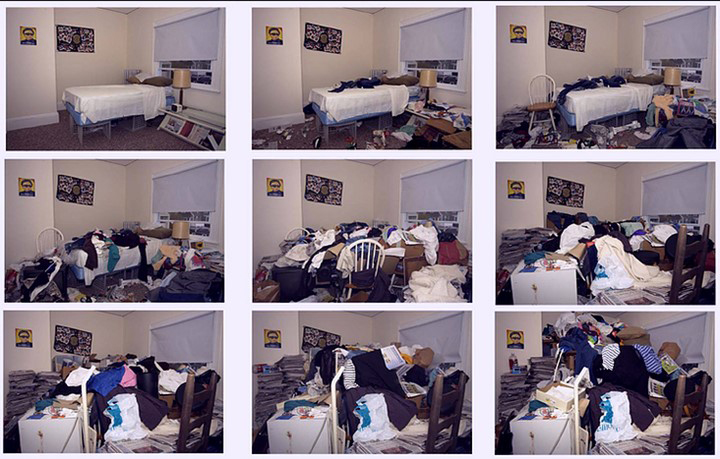Article by Karen Hanagan, Fairfax County Aging, Disability and Caregiver Resource Team
(Posted 2021 April)

Hoarding is a real-life struggle. It is the need to obsessively collect things, even if worthless, or a tendency to hang onto items you really don’t need. As with most conditions, understanding and empathy, along with a big dose of kindness and patience, can help those who suffer.
Obsessive hoarding is a mental health condition aptly named “Hoarding Disorder.” Since 2013, this disorder has been covered under the Americans with Disabilities Act, and you may seek treatment by a behavioral health practitioner.
As with other diseases, there are many levels.
In extreme hoarding, some may face eviction, loss of children, illness from unsanitary conditions and even divorce. Mild hoarding may include excessively acquiring items that you don’t have space for, e.g., the items may create a safety hazard and not needed.
No matter the level of hoarding, kindness is the starting point, so never refer to a person with this condition, including yourself, as “a hoarder.” Focus should be on the unique qualities of the individual and not the person’s clutter.
If you are not certain there is a hoarding issue, use this list from The Diagnostic and Statistical Manual of Mental Disorders, published by the American Psychiatric Association. The manual defines Hoarding Disorder as:
- Persistent difficulty discarding or parting with possessions, regardless of their actual value.
- Difficulty is due to a perceived need to save the items and to distress associated with discarding them.
- Accumulation of possessions that congest living areas and substantially compromises these area’s intended use. If living areas are uncluttered, it is only because of the interventions of third parties (e.g., family members, cleaners, or the authorities).
Significant distress or problems in important areas of functioning, e.g., at home or work (including a safe environment for the person and others).
Due to a lack of understanding, hoarding often causes stress and may damage relationships, as is true of any chronic illness. Understanding how a person who has difficulty parting with items feels about their possessions will help to build empathy for their reluctance to get rid of them.
Here are some common thoughts about possessions that elicit strong feelings for those with the disorder.
- If I don’t buy this now, I’ll regret it forever.
- Losing this possession is like losing a friend.
- Throwing this away means losing a part of my life.
- I am responsible for this possession.
- I might need this someday.
- It would be wasteful to throw this out.
If you take a moment to feel the regret, panic, sadness, and failure associated with the above statements, you may better understand the great sense of loss a person with this disorder feels when trying to discard items.
If your life has been touched by a hoarding disorder, accepting or giving help is an act of kindness.
Those with the disorder may wish to let especially calm, thoughtful, and empathic people into their lives. Let them help make your living space more comfortable. Ways to begin decluttering life include:
- Answer the question: Is this exactly the way I want my living spaces to be?
- Make a list of: A) what are the positive feelings from the “excess” items you have around you and B) what keeping them has done to your personal relationships and how keeping them interferes in other ways with daily life.
- Look at magazines with pictures of different living spaces. Decide which ones are how you want your home to look. Cut them out and adhere to the door or another visible spot.
- Consider working with a clinician who can guide friends and family helpers with you as a team. There are some who take Medicare.
- Hire a decluttering professional, there are many seasoned ones in the Washington, D.C. area.
- You may keep me focused by asking me things like, “In the long run, are you better off keeping it or letting it go?” but do not act like a drill sergeant or shame me.
- You may help me decide which things to donate, throw away, keep or put in storage but do not move my things without my permission.
- We will work until I get too tired or overwhelmed.
- Everyone involved might want to use tape or string to identify one reasonable section of the home and work only within that section, to lessen the overwhelming feeling everyone may have at the start of the job.
- Take breaks. Go out to lunch, now that the weather is warmer and outside meals are possible, and treat yourself to a nice meal during the cleanout process. Celebrate achievable goals and small victories.
Some of the leading researchers on this topic are David Tolin, Randy O. Frost and Gail Steketee. They have authored self-help books as well as guides for helpers, and list support groups. Anything you find on internet searches involving these three authors would be thoroughly researched and vetted. Their guidelines to be practical and easy to follow.

This article is part of the Golden Gazette monthly newsletter which covers a variety of topics and community news concerning older adults and caregivers in Fairfax County. Are you new to the Golden Gazette? Don’t miss out on future newsletters! Subscribe to get the electronic or free printed version mailed to you. Have a suggestion for a topic? Share it in an email or call 703-324-GOLD (4653).

